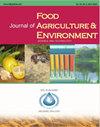消费者对土耳其有机水果和蔬菜购买地点的偏好。
引用次数: 8
摘要
本研究的主要目的是衡量土耳其消费者对购买有机水果和蔬菜的地点的偏好。研究还探讨了影响消费者偏好程度的因素。数据来自对803名随机选择的消费者的调查,这些消费者来自土耳其五个最发达的地区(马尔马拉、安纳托利亚中部、爱琴海、地中海和黑海),以及五个最发达的城市(伊斯坦布尔、安卡拉、伊兹密尔、阿达纳和博卢)。这项研究分两个阶段进行。在第一阶段,模糊两两比较(FPC)应用于计算偏好的量度。建议消费者购买有机水果和蔬菜的地点有五种:本地市场、蔬菜水果店、超级市场/大卖场、网上零售商(互联网)和专卖店。根据从FPC获得的偏好措施,将购买地点从最受欢迎到最不受欢迎排序。调查结果显示,消费者购买这些商品最主要的场所是本地市场和超市/大卖场。现有的专营店营销渠道对土耳其消费者来说并不是一种方便的营销方式。在第二阶段,使用Tobit模型将第一阶段的消费者偏好回归到消费者特定的变量上。对购买有机果蔬地点的偏好主要受性别、年龄、受教育程度、收入、家庭规模、购买有机果蔬的频率和地区差异的影响。处理农业营销的政策制定者应考虑不同地区消费者偏好的差异以及消费者的经济和人口属性,以确定有效的营销渠道。本文章由计算机程序翻译,如有差异,请以英文原文为准。
Consumer preferences for purchase places of organic fruits and vegetables in Turkey.
The major aim of this study was to measure the preferences of Turkish consumers regarding places to purchase organic fruits and vegetables. The study also explored the factors influencing the degree of consumer preferences. The data were obtained from a survey of 803 randomly selected consumers from the five most developed regions of Turkey (Marmara, Central Anatolia, Aegean, Mediterranean and Black Sea), as well as the five most developed cities (Istanbul, Ankara, Izmir, Adana and Bolu) within the defined geographic regions. This study took place in two stages. In the first stage, fuzzy pair-wise comparison (FPC) was applied to calculate a measure of preferences. Five types of venues for the purchase of organic fruits and vegetables, local market, greengrocers, supermarkets/hypermarkets, web-based retailers (the internet) and specialized stores were suggested to consumers. The purchase places were ranked from most to least preferable depending on preference measures obtained from FPC. The results show that the most important venues for the purchase of these items are local markets and supermarkets/hypermarkets. The existing marketing channel via specialized stores is not a convenient marketing approach for Turkish consumers. The consumer preferences from the first stage were regressed upon the consumer-specific variables by using a Tobit model in the second stage. Preferences regarding places to purchase organic fruits and vegetables are mainly influenced by gender, age, education, income, family size, frequency of purchasing organic fruits and vegetables and regional differences. Policy makers dealing with agricultural marketing should consider differences in consumer preferences among regions and economical and demographic attributes of consumers for determining an efficient marketing channel.
求助全文
通过发布文献求助,成功后即可免费获取论文全文。
去求助
来源期刊
自引率
0.00%
发文量
0
审稿时长
2.9 months
期刊介绍:
The Journal of Food, Agriculture and Environment (JFAE) publishes peer-reviewed articles, original research, critical reviews or short communications in food science and technology, human nutrition, animal sciences; agricultural and environmental sciences. This journal encourages articles on interdisciplinary research in the fields of food, agriculture and environment. The core objective of this journal is to enlighten and encourage research on cutting-age themes and innovations by scientists, researchers, students, professionals, academicians, policy-makers, and stake holders. The JFAE also considers manuscripts on ethical and socio-economic issues related to modern agricultural or environmental sciences. The Journal also offers advertisement space for special announcements from, and employment opportunities within, food, agricultural and environmental organizations in public and private sectors.

 求助内容:
求助内容: 应助结果提醒方式:
应助结果提醒方式:


